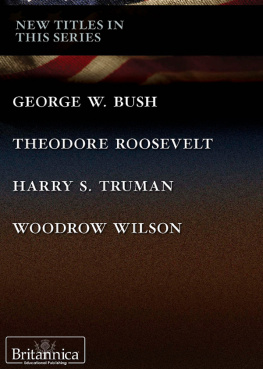George W. Bush and the
Redemptive Dream
Inner Lives
Series Editor
William Todd Schultz
Forthcoming books in the series:
William Todd Schultz on Truman Capote
Alan C. Elms on Sigmund Freud
Tim Kasser on John Lennon
Kyle Arnold on Philip K. Dick
George W.
Bush and the
Redemptive
Dream
A Psychological Portrait
Dan P. McAdams


Oxford University Press, Inc., publishes works that further Oxford Universitys objective of excellence in research, scholarship, and education.
Oxford New York
Auckland Cape Town Dar es Salaam Hong Kong Karachi
Kuala Lumpur Madrid Melbourne Mexico City Nairobi
New Delhi Shanghai Taipei Toronto
With offices in
Argentina Austria Brazil Chile Czech Republic France Greece
Guatemala Hungary Italy Japan Poland Portugal Singapore
South Korea Switzerland Thailand Turkey Ukraine Vietnam
Copyright 2011 by Oxford University Press, Inc.
Published by Oxford University Press, Inc.
198 Madison Avenue, New York, New York 10016
www.oup.com
Oxford is a registered trademark of Oxford University Press, Inc.
All rights reserved. No part of this publication may be reproduced, stored in a retrieval system, or transmitted, in any form or by any means, electronic, mechanical, photocopying, recording, or otherwise, without the prior permission of Oxford University Press.
Library of Congress Cataloging-in-Publication Data
McAdams, Dan P.
George W. Bush and the redemptive dream: a psychological portrait/
Dan P. McAdams.
p. cm.
Includes bibliographical references.
ISBN-13: 978-0-19-975208-9 (alk. paper)
ISBN-10: 0-19-975208-7 (alk. paper)
1. Bush, George W. (George Walker), 1946Psychology. 2. Decision makingPsychological aspects. 3. RedemptionPsychology I. Title.
E903.3.M43 2011
973.928092dc22
[B]
2010026601
9 8 7 6 5 4 3 2 1
Printed in the United States of America on acid-free paper
For Ruth and Amanda
Contents
ONE
The Actors Traits
TWO
Fathers and Sons
THREE
On Being a Conservative
FOUR
Variations on a Redemptive Theme
FIVE
An American Story
Acknowledgments
Many good friends and colleagues provided support, advice, and critique during the period I worked on the Bush project. My biggest thank you goes to my wife, Rebecca Pallmeyer, who read and carefully considered every word of every draft. She provided invaluable editorial assistance throughout, to say nothing of the unconditional love. Next in line for my sincere gratitude stand Brad Olson, Jon Adler, Jim Anderson, and Todd Schultz. Brad worked with me early on to gather sources and think through aspects of the books arguments, and he gave me good advice for every chapter. Jon sent me wonderfully astute suggestions for all the chapters via email. Jim also provided written critiques, and he gave me further advice and strong encouragement at our weekly tennis outings. In addition to providing thoughtful editorial advice on all the chapters, it was Todds brilliant idea to launch a book series with Oxford University Press on Inner Lives, for which this book is the inaugural volume.
Let me also express my gratitude to the many people who read various chapters and responded with good advice, words of wisdom, and the like. They include: Michelle Albaugh, Bob Arkin, Keith Cox, Joe Dadabo, Renee Engeln-Maddox, Hal Ersner-Hershfield, Jonathan Haidt, Kathrin Hanek, Walter Hanek, Brady Jones, Mike Kaufman, Miriam Klevan, Gina Logan, Hank Neuberger, Bill Peterson, Tasha Richardson, Rick Robins, Jim Spillane, Keegan Walden, and Josh Wilt. And special thanks to Lori Handelman at Oxford University Press for her strong editorial support.
The research that went into the making of this book was supported by a grant from the Foley Family Foundation of Milwaukee, Wisconsin, to establish the Foley Center for the Study of Lives at Northwestern University.
George W. Bush and the
Redemptive Dream
Introduction: Why Did
President George W. Bush
Invade Iraq?
When it comes to the psychology of George W. Bush, there are two prevailing views. The first is that he was an idiot. The second is that he was a saint.
Idiot is not the technical term, of course. Those who revile the 43rd president have accused him of many psychological shortcomings. Some have claimed, for example, that he suffered from a serious case of Attention Deficit Hyperactivity Disorder, or that his general intelligence was simply too low to be an effective president of the United States. One Washington psychoanalyst has written that the first 2 years of life rendered George W. Bush an undernurtured and emotionally hobbled infant, terrified of confronting the dangers within his own psyche. Whether the critics, then, are talking about his powers of cognition or his basic emotional makeup, George W. Bush just didnt have the necessities.
Arguments for sainthood, or something like that, come from those who admire what they see as his rock-solid convictions and his steadfast commitment to protecting America from terrorism. Relentlessly optimistic and deeply principled, George W. Bush was a paragon of robust mental health and social engagement, his defenders have asserted. And dont forget that he stood strong against evil. Called to a higher purpose, he rallied the nation in a time of crisis. Affable, dynamic, and inspiring, he was a man of action who championed freedom for the world. You watch: he will be vindicated in the end!
Both sides agree on one thing, though: George W. Bush was a big deal, even by the exalted standards of American presidents. No Chester Arthur was he. This guy had a huge impact. He was a transformational president, an extraordinarily consequential actor on the world stage, perhaps the most consequential actor to date in this young century.
Arguably the most consequential aspect of the Bush presidencythe biggest decision he ever madewas the American invasion of Iraq, which began in the spring of 2003. The decision was controversial from the beginning. In contrast, for example, to the near-unanimous support from Congress that President Lyndon B. Johnson enjoyed in the first 1 to 2 years of the American buildup in the Vietnam War, politicians and many Americans spoke out against the Bush administrations plan to invade Iraq long before the invasion was launched. In the wake of 9/11 and in the midst of the administrations all-out persuasion campaign to convince Americans that Saddam Hussein must be eliminated, a total of 133 congressional representatives and 23 senators voted, in October 2002, against authorizing the president to use armed forces in Iraq. An obscure politician in Illinoisdestined to become Bushs successor in the White Housecalled it a dumb war. As the Iraq War dragged on, an increasing number of critics moved well beyond words like dumb to debacle, quagmire, and senseless tragedy. But others, by contrast, never gave up on their support. When the 2007 surge of additional troops occasioned some decline in hostilities and improvement in the political situation in Iraq, the wars supporters were jubilant, while its detractors were unimpressed. All in all, the Iraq War may be the most polarizing legacy of the Bush presidency.
Let us recall, albeit briefly, how it all happened back then:
September 11, 2001: Terrorists attack the World Trade Center and the Pentagon, killing approximately 3,000 Americans. The administration quickly realizes that Osama bin Laden and the Al Qaeda network are responsible for the attacks. Within days, the president and his national security team begin planning a military response for Afghanistan, the terrorists presumed refuge.
Next page








